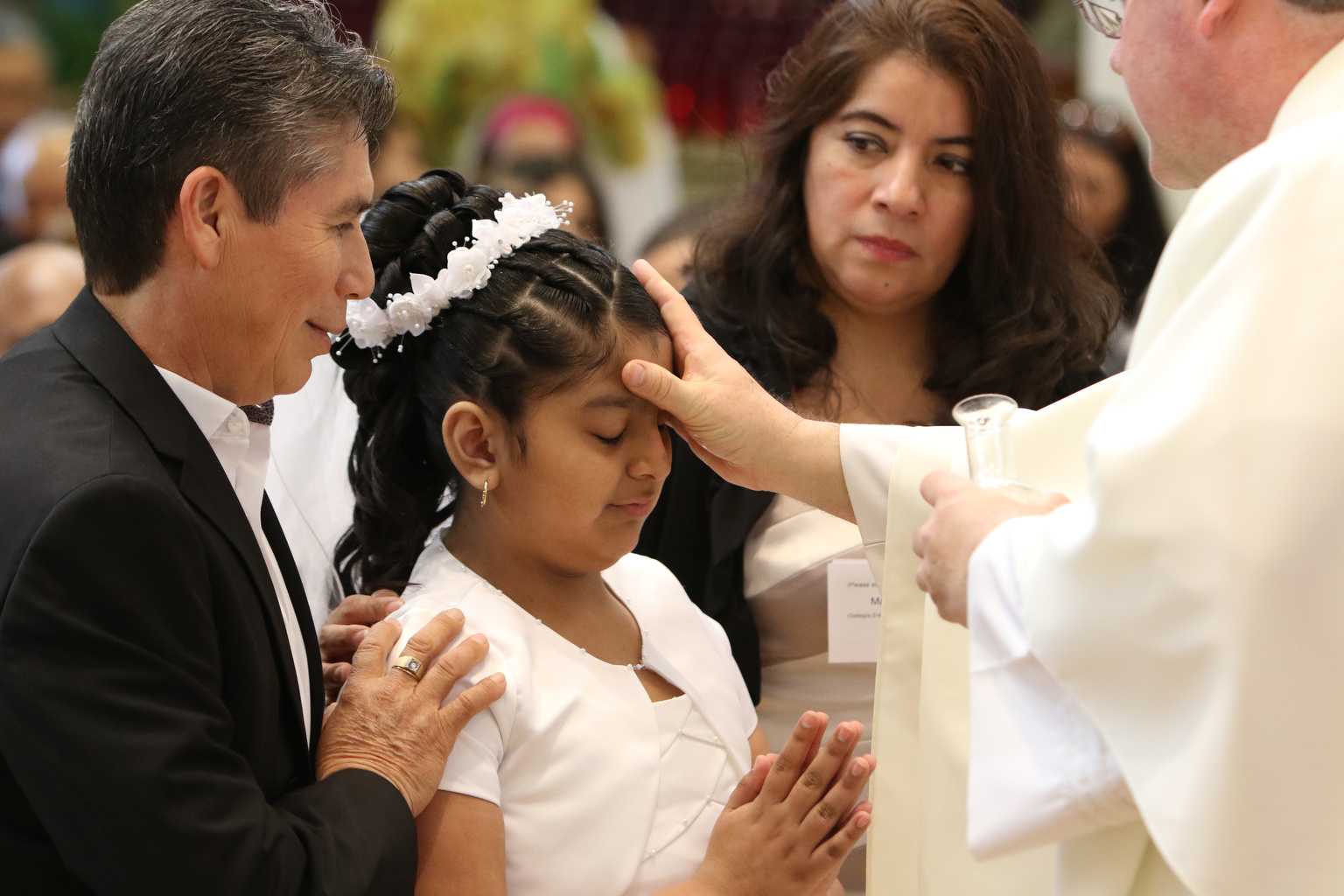
Erika Gallegos, 9, is confirmed by Fr. Christopher Nowak during a Mass at St. John of God Church in Central Islip, New York, April 11, 2016. (CNS/Gregory A. Shemitz)
Before we do the rite of enrollment for our candidates for confirmation, it's important for them, and for all of us, to reflect at least briefly on the Scriptures today. I think it's important (and I really emphasize this for the candidates who are being enrolled today, but again, for the rest of us) during the time that you're preparing now for the sacrament of confirmation, you'll be learning more about the teachings of our faith. You'll be encouraged to learn more about prayer and reflection. You'll be encouraged to try to, in a very special way, learn all that we can about what it means to be a Catholic, a Christian.
But I urge you — the most important thing is not learning a list of doctrines. We do that every Sunday. We recite the creed or we remind ourselves of doctrines from our faith, one after the other, that we believe, and that's important. But the really, and I would say the most important, the only important thing in your preparation is to come to know Jesus better. To be a Christian, to be a confirmed Christian means to be someone who is committed to following Jesus. We can't follow him unless we know him, know how he lived, how he acted, and what he taught.
So, during these next weeks when you're preparing (and for the rest of us it's kind of a review), probably the most important thing is to take the Bible that you'll be given later and to read more and more of the Gospels, to read about Jesus, to get to know him as one like us in every way, and to deepen your relationship with Jesus. That's what's most important. Every Sunday you have an opportunity, especially to read the Scriptures ahead of time, to come to church, and to reflect together with the parish family, and to get to know Jesus more deeply.
Today in the Gospel lesson, I think we discover something about Jesus that we're maybe a little surprised at. He was very strong, wasn't he, when he spoke to those leaders of God's people and criticized them because they were always trying to draw attention to themselves. They wanted the first place whenever they joined a group. They wore special garments. They wanted special titles. Jesus said that's wrong. Everyone in my community is equal in freedom and dignity. There aren't hierarchies — some higher, some lower. No, it's a community of God's people, all of who are equal in every way
Yet, we need to listen to Jesus today and understand why he was so harsh in his criticism of the leaders. If you notice, it's part of the prophetic role of Jesus, following on those words of Malachi in our first lesson where that prophet, hundreds of years before Jesus, also criticized the leaders for taking advantage of the people. Jesus shows us a side of himself where he is quite harsh and direct. If you go on a little bit further in the part of Matthew's Gospel, he says, "Woe to you, teachers of the law, you Pharisees, you hypocrites!"
The one thing that Jesus is very harsh about is he can't stand hypocrites, someone who pretends to be one thing and is another. These leaders were like that. They pretended to have great holiness and wanted everyone to notice it, but they weren't; they were hypocrites and Jesus says that very clearly. That's something about Jesus that, perhaps as I've said, we aren't so aware of, how he could be hard when it came to evil, when it comes to hypocrisy, pushing ourselves forward, being inauthentic. Jesus wants us to be genuine, true to ourselves, true to God. So he judges those who aren't in a very harsh way.
As you go along learning about Jesus, they'll be many other ways that you come to know Jesus — how he grieved with people, how he was always reaching out to help people, how he loved, how he laughed, how he cried. You really come to know Jesus as someone very close. He can become very close to any one of us as a friend. I hope during your time of preparation that you will really try very hard to come to know Jesus.
Advertisement
I like these words from St. Paul in our second lesson today where he is talking about how he ministered without payment. He worked every day to earn his own pay. But then how the people responded; he says, "This is why we never cease giving thanks to God for you because on receiving our message, you accepted it, not as some human teaching, but as the very word of God. That is what it really is, and as such it is at work in you who believe."
That's what we will say about our candidates: If you go into this preparation period with great intensity and really commit yourself to it, to come to know Jesus, on your confirmation day we will be able to say to you, "We never stop giving thanks to God for you because you have received the message. You know Jesus and you commit yourself to follow him." We hope that can be said about every one of us.
[Homily given Nov. 5 at St. Philomena Church in Detroit. The transcripts of Bishop Thomas Gumbleton's homilies are posted weekly to NCRonline.org. Sign up here to receive an email alert when the latest homily is posted.]







